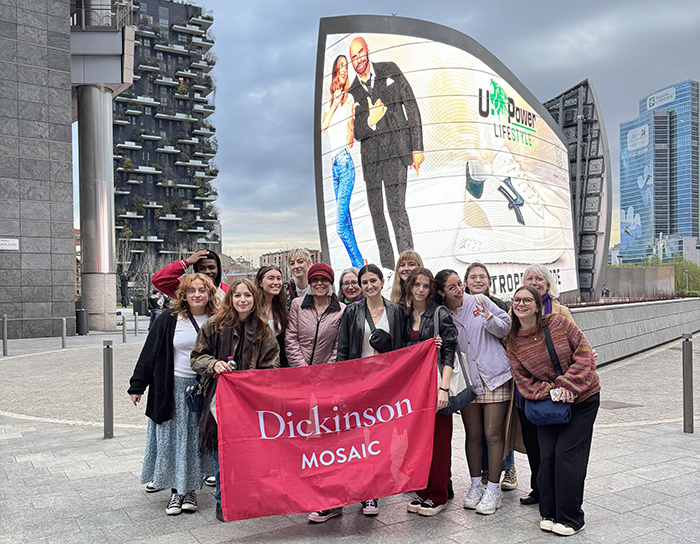Mosaics, Globally Integrated Courses & Global Scholars

Global Mosaics
Global Mosaics are intensive, interdisciplinary research programs designed around ethnographic fieldwork and immersion in domestic and global communities. Their objective is to encourage students to think reflectively about the diverse world in which they live as they engage in collaborative work with local, transnational and international communities. Global Mosaics provide opportunities for students to apply what they are learning in the classroom—both theoretically and methodologically—to the world beyond and to bring their experiences in the world back into the classroom.
The following is a list of current/upcoming Mosaics:
The following is a list of some past Mosaics:
- Green Cuisine: An Exploration of French Culture, Food Systems and Economics - Spring 2025
- Teaching the Transatlantic Slave Trade - Fall 2024
- Fashioning the Body, Shaping the Nation: Fashion through the lens of history, culture, gender, and race - Spring 2024
- Energy Pasts and Futures: Sustainability and the Energy Transition in Germany, Spring 2023
- Managing Death and Dying in Cross-Cultural Perspective, Spring 2022
- Rwanda Mosaic: After Genocide and Apartheid, Spring 2019
- Cuba Mini Mosaic: The African Diaspora, May 2018
- Climate Change and Human Security in Nepal, Fall 2017
Mosaics are being developed on a continuous basis. For more information, please visit the Mosaics program page.
Globally Integrated Courses
Globally Integrated Courses link the study of a global theme or issue in a semester-long course with the opportunity to build on and deepen understanding of the issues through fieldwork or research at a global center or site. Globally Integrated Semesters include additional globally-themed workshops throughout the semester.
The following is a list of current and planned Globally Integrated Courses:
- Classics in Rome - Fall 2025
- Tourism in the Alps - Spring 2026
The following is a list of some past Globally Integrated Courses:
- Living High: Food Literature and/as Culture in the Basque Country, Spring 2024
- Sex and the City of Light: Early 20th Century Women of Paris, Spring 2023
- Argentina GIS: Argentine Adventures through Contemporary Literature, Spring 2022
- Brazil GIS: Brazilian Cultural and Social Issues, Spring 2022
- France GIS: Sustainability in France, Spring 2022
- Germany GIS: The Entrepreneurial Mindset, Spring 2022
- Iceland GIS: Arctic Studies, Spring 2022
- Food and Energy in Israel and the United States, Spring 2020
- Sustainability in Italy: Environment, Culture and Food, Fall 2017
Global Scholars
The Global Scholars program is an initiative to promote student scholarship at our partner institutions abroad. This program allows select Dickinson students to join a faculty-led student research team to study issues of global significance while participating on a Dickinson study abroad program.
Past Global Scholar Programs include:
- Global Scholars US-Japan
Dickinson, in partnership with Akita International University and co-funded by a grant from the Japanese government, is undertook an in-depth research project on perceptions of quality of life among older adults, particularly the relationship between perceived well-being and access to/utilization of health care services. The research was conducted in two structurally similar but geographically distinct regions: Harrisburg, Pennsylvania, and Akita City, Japan.
